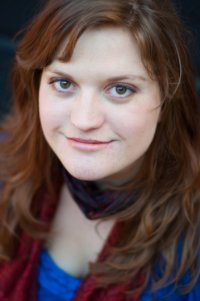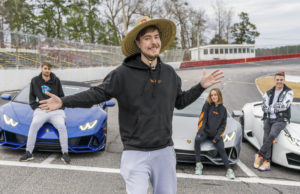Jefferson alumnus Meagan Spooner answers questions about her writing career

Jefferson alumnus Meagan Spooner. Photo courtesy of www.meaganspooner.com.
March 23, 2014
Author of young adult fantasy and science fiction novels, Jefferson alumnus Meagan Spooner answered several questions posed by the staff of tjTODAY about her life since graduating from high school and her current career in writing. Through her novels, including Skylark and These Broken Stars, Spooner has inspired and entranced her audiences through her captivating story lines and creative novel ideas. Successful in her writing endeavors, Spooner’s novel, These Broken Stars, was named the best overall young adult book of the year by Huffington post on Dec. 16, 2013. With several more novels to come out in the coming years, Spooner’s writing career is just beginning.
Q: How has your life been since you graduated from Jefferson? Do you believe that being at Jefferson made your writing career better?
A: There’s a culture at TJ that you don’t find at most public schools—that smart isn’t only okay, it’s cool. Being high-achieving is cool. Being driven, having goals and going after them, is not just okay, it’s admirable. I remember being in middle school and being mocked and bullied for reading books. Packs of roving mean girls would take my books from me in the cafeteria and tear pages out, or throw them in the trash, or onto the floor. That’s the sort of thing you’d never see in a million years at a place like TJ. Yes, it comes with its own set of drawbacks. The pressure is high, higher than the pressure was for me in college. The fear of failure—be it academic, athletic, artistic—is more visceral, always looming over your shoulder. But I count myself extremely fortunate to have been able to attend TJ in high school, because that very air of “achievement is good” is part of what led me, several years down the road, to pursue a writing career in earnest.
Q: When you visited Jefferson this month, how did it feel to walk through the halls again? Are there any memories that you especially liked at Jefferson?
A: Being in the Audlob again was surreal. There’s a lot of construction going on right now, and maybe it won’t look like what I remember once it’s done, but for now I can still see exactly where I sat with my friends every day at lunch. Our between-classes hangout spots would change every year, depending on where people’s lockers were, but lunchtime was always in the Audlob. In high school I wrote a lot of fanfiction, because I wasn’t quite confident enough to believe that anyone would want to read my original fiction. But fanfiction has built-in lovable worlds and characters, which gave me the confidence to share my work with my friends. We’d sit at the corner to the right of the auditorium doors and trade lunches (I always switched my turkey sandwiches for my friend’s zongzi) and talk about stories. It was, in essence, my very first critique group. And I loved it.
Q: What made you choose to become a writer? Can you see yourself in any other job?
A: I decided to be an author when I was four years old, so it’s been a lifelong goal for me. It never occurred to me, however, that I could be the full-time novelist I am now, so even as a kid I assumed I’d have some other job. Throughout the years it’s been a lot of things. Astronaut (turns out I’m claustrophobic and need glasses, so that was out). Marine biologist (inner ear problems mean I can’t really go underwater). Archaeologist (I’m a redhead and everything that goes with: I turn into a lobster in sunlight, so desert excavations nearly killed me in college). After I graduated from college I worked for a year at a marketing firm as an analyst for TV and movies, which would have been perfect for me… if only I wasn’t miserable because I wasn’t writing. The “too long, didn’t read” version? I’m pretty sure I’d starve if I wasn’t an author.
Q: What inspires your novels? Is there a specific process you follow when writing a book?
A: My process is different for each book, and my sources of inspiration are different as well. For the Skylark Trilogy, it was a rainy drive home while listening to NPR. They did a segment on alternative fuel sources to alleviate the energy crisis, and as a lifelong science fiction and fantasy lover, my mind started to go “…what if?” I thought about a world that runs on magic, not electricity, and what would happen if magic, too, was a limited resource. For the Starbound Trilogy, it was a series of conversations with my co-author, Amie Kaufman, about space, other dimensions, faster-than-light travel, and how we’d survive if we ever ended up crash-landed on an alien planet. (Because this is what my friends and I talk about, when left to our own devices.)
In general, however, I spend a long time—often months—just thinking about the story, letting it percolate and steep in the various bits of idea fragments floating around in my head, before I ever start writing. Once I do begin, I write from start to finish without stopping or deviating. I don’t outline, I don’t write out of order. But the important thing to know is that every author does it differently, and there are amazing authors out there who, if asked to do it my way, would be completely unable to write a book. And it’s the same for me, trying to do things their way.
Q: What do you consider your biggest accomplishment since you graduated from high school? Why do you believe this particular feat is you best achievement?
A: I think most people would expect me to say “getting published.” And a few years ago, I probably would’ve said that. Because it’s true, it’s an incredibly tough market out there, and competition is fierce. But I’ve also struggled with anxiety and depression my whole life, which is something I suspect many TJ students can relate to—we’re sensitive, creative, driven, intelligent, thoughtful people. And those wonderful qualities often come with drawbacks. For me, I think my greatest achievement since high school has been learning how to deal with those issues and end up with a productive, balanced life. It’s still a challenge, and I slip up often. It’s far easier to fall into a pattern of despair, stress, and self-doubt than to walk that other path, the one where everyday involves self-talk to keep moving; where you keep close friends nearby who know what warning signs to watch for; where you choose to be kind to yourself and, instead of beating yourself for your failures, you choose to move past them and focus on tomorrow.
Q: What are your goals for the future? Is there anybody you are aspiring to become or someone you look up to?
A: There are a million people I aspire to become, and the list grows every day. I’m always striving to be more like some of my author friends, like Beth Revis and Marie Lu, who are some of the kindest, most generous people I know—or like Steph Perkins, who is so open about her own struggles with mental health that it gave me the courage to ask her for help when I needed it. These days, I tend to admire people more for who they are and less for their achievements. Growing up, I wanted desperately to be Neil Gaiman and Jo Rowling and Joss Whedon—and while my admiration for them and their work is still just as fierce, I feel much less driven to become them for their careers. I think that way lies jealousy, which tears your creativity down rather than build it up.
Q: Do you have any advice for aspiring novelists at Jefferson?
A: My standard advice is: 1) read a lot, and read in a wide variety of genres; 2) write every day, even if it’s only a few sentences; and 3) get used to sharing your work with others as early as you possibly can.
But my advice for TJ students, specifically, is this: take a deep breath. No, really. I almost never stopped, when I was in high school, because at TJ you feel like you can’t. There’s always more work to do, and if you’re done with your academic work, there’s crew practice, and band practice, and SAT prep, and play rehearsal, and volunteer work. For me, my writing goals were like that, too. I felt that I had to get published, and I had to do it right now, when I was still young, or else I wasn’t living up to what everyone thought I could be. As it turns out, when I did get my first three-book deal at 25, and then a second three-book deal six months later, the entire industry was gawking at me for being so young. It’s all perspective. You actually have so much more time than you realize to achieve the things you want.
Find out more about Meagan Spooner in this upcoming print issue of tjTODAY.





